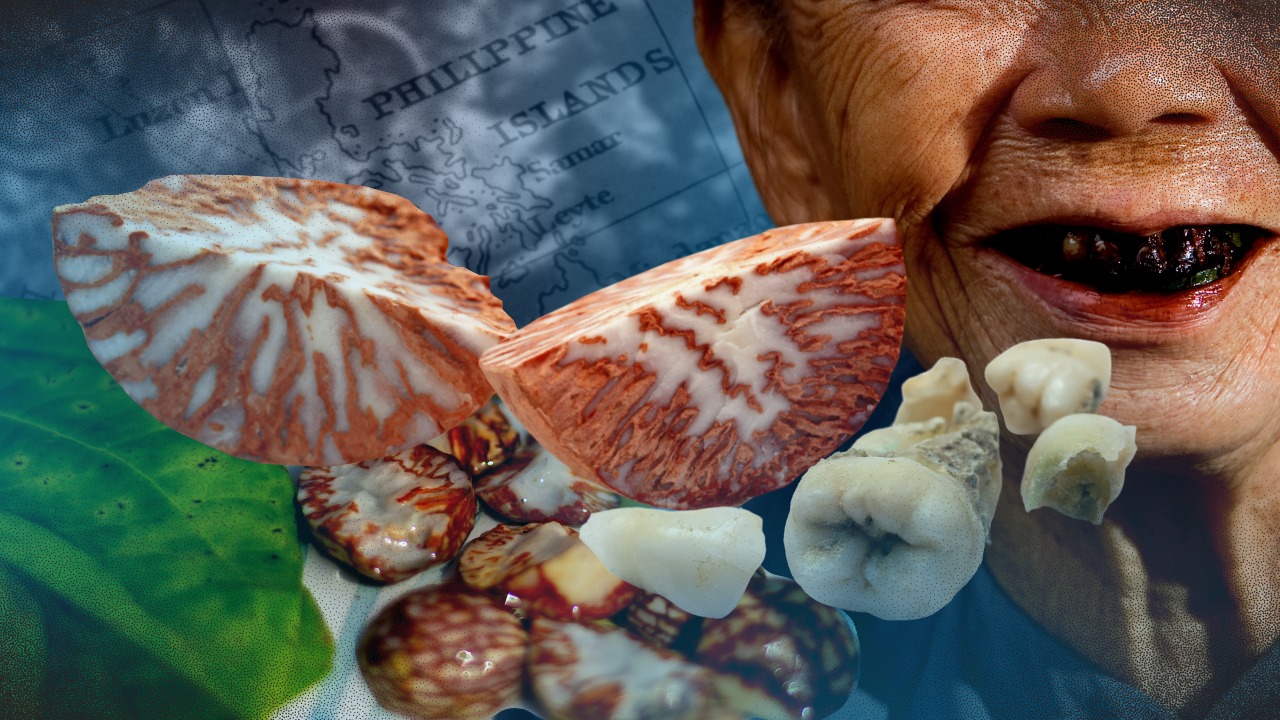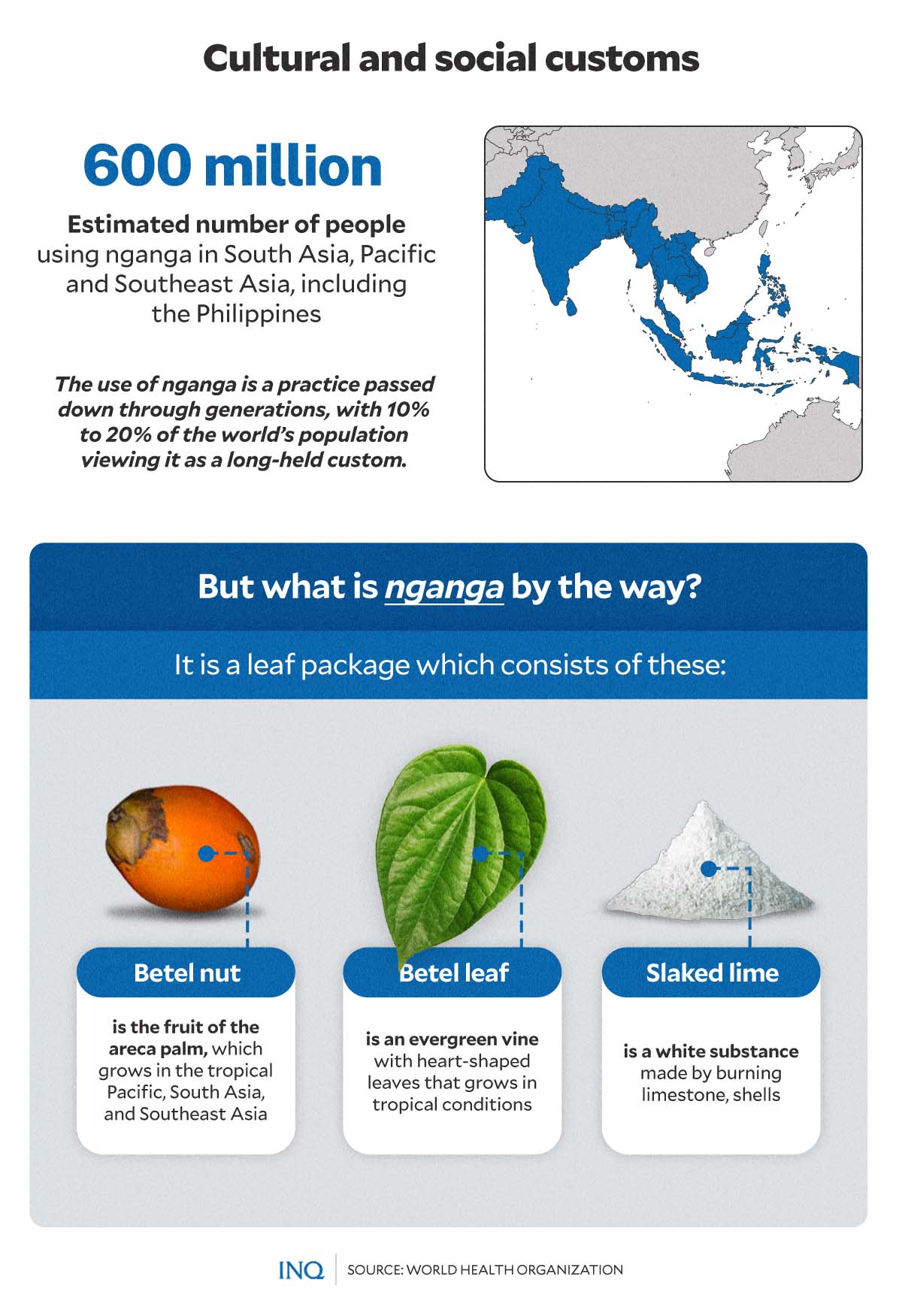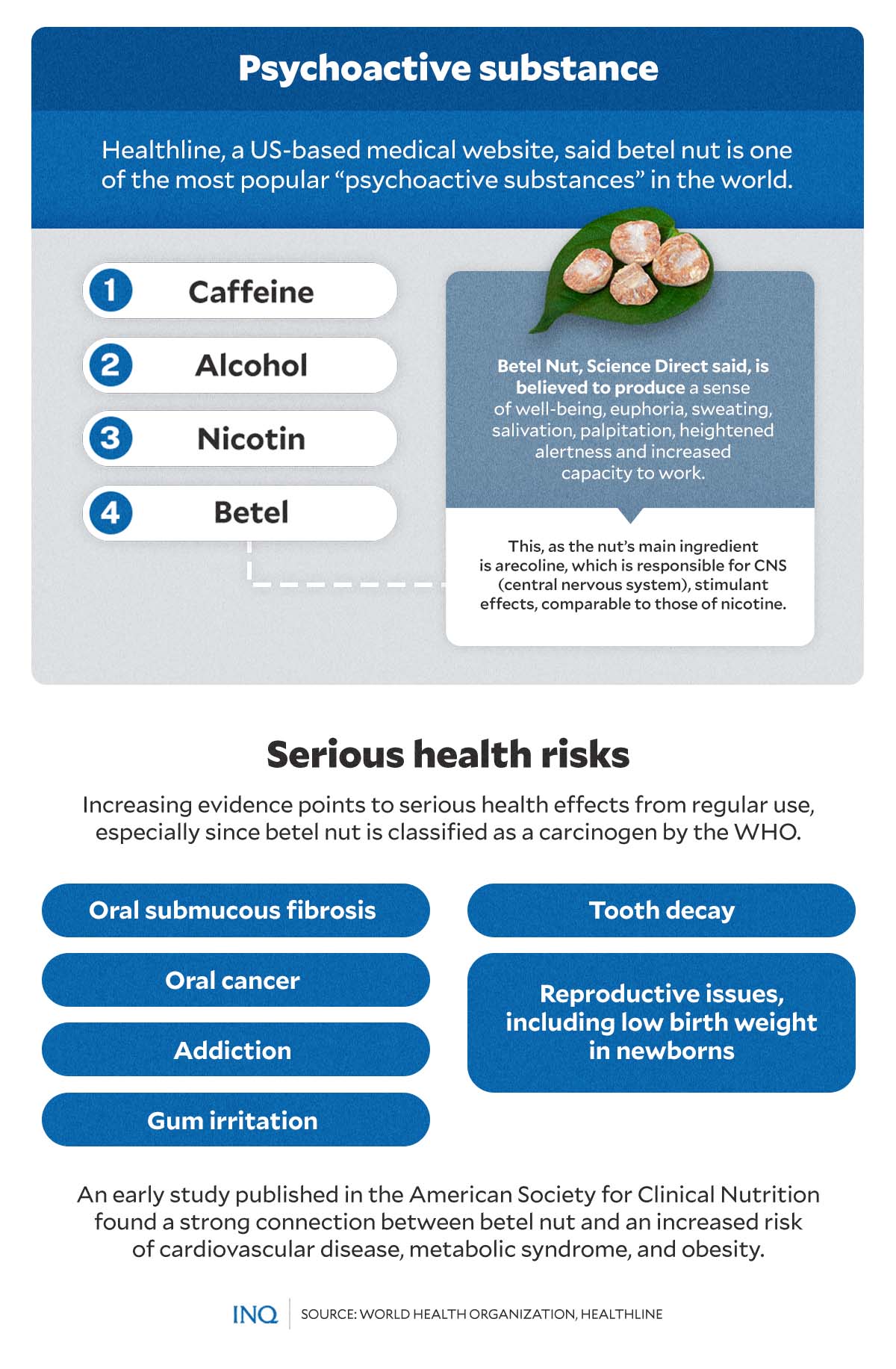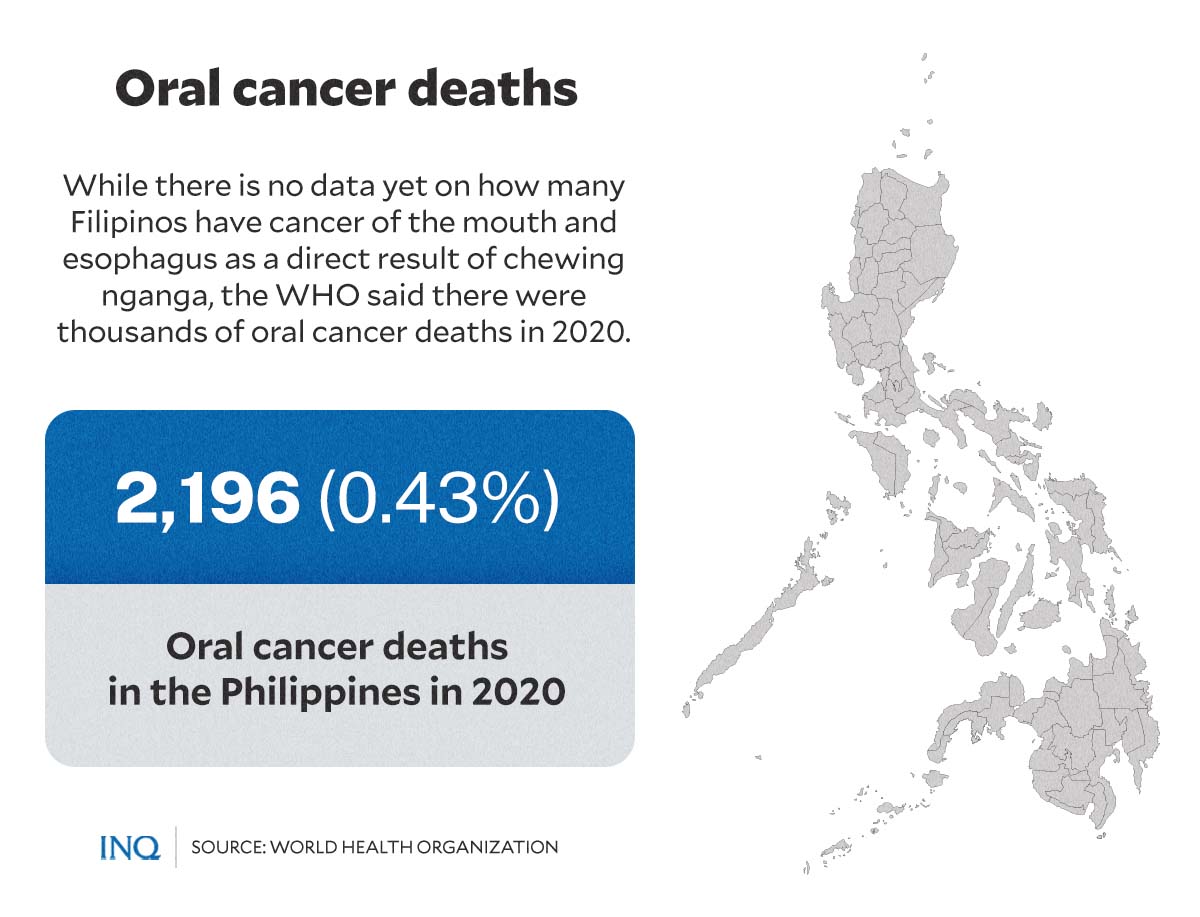Dental Health Month: The dangers of ‘nganga’

INQUIRER.NET COMPOSITE IMAGE/JEROME CRISTOBAL
MANILA, Philippines—It was in 2012 but Maria Osio still remembers how she was shocked to see the road outside their house “painted red” on the day of her brother’s burial.
There were red stains all over, she said, revealing that it was the work of their relatives from a nearby province, who had been chewing nganga, which is a mix of betel nut and slaked lime, wrapped in betel leaves.
Buyo in Tagalog, chewing quid is a “cultural custom,” especially since based on data from the World Health Organization (WHO), over 600 million people chew betel nut in countries in South Asia, Pacific and Southeast Asia, including the Philippines.
Take the case of 10 indigenous communities in Abra province in Luzon, which Dr. Ramarie Fernandez Dickson, former president of the Philippine Dental Association (PDA), said are consuming nganga.
As Dr. Joseph Lim, former associate dean of the College of Dentistry of the University of the East, said in his column, most of these communities are in Tineg, Boliney, Tubo, Lacub, Malibcong, Luba, Sallapadan, Bay-Licuan, Bucloc and Daguioman.
READ: Chewing ‘buyo’
Even in Zamboanga City in Mindanao, which is almost 2,000 kilometers from Abra, hundreds of people still indulge themselves in the “cultural custom,” with a lot of market stalls selling the quid because of demand.

GRAPHIC Ed Lustan
Some people who chew nganga also find it reinvigorating while some find it relaxing, as stressed by the University of Florida Health in a publication last year, saying that use of nganga has various effects.
However, while people have reasons for chewing betel nut, its use has not been spared from concerns, especially regarding its implications to sanitation and how it can cause serious health problems.
No more ‘freedom of spit’
Actually, just recently, a new crackdown on irresponsible nganga enthusiasts has been ordered by Baguio City Mayor Benjamin Magalong, who stressed that it is “disgusting” to see nganga stains in public places.
Likewise, Magalong, who declared that Baguio City should be kept “clean and green” by its residents, pointed out that the issue is not only cleanliness, but health and sanitation, pointing out that the quid “could even spread virus.”
He said barangay officials and cooperative or transport officials should help stop the irresponsible use of nganga, reminding them that there is an ordinance imposing penalties for violators.

GRAPHIC Ed Lustan
Looking back, Magalong also ordered the same in 2021, directing the police and the local government’s Public Order and Safety Division to intensify its campaign against the irresponsible use of the quid, especially amid the COVID-19 crisis then.
It can be recalled that in 2020, the Baguio City Council approved an ordinance regulating the use of nganga in public places and even in private or public vehicles without the required container.
Based on Ordinance No. 35, series of 2020, there is a penalty of P500 or four hours of community service for the first offense and P1,000 or six hours of community service for the second offense.
Then for the third offense, a stiffer penalty of P2,000, eight hours of community service or three-month imprisonment or both can be imposed, the council said. The use of nganga is allowed in religious gatherings, though.
Burst of energy
As WHO said, chewing nganga is a practice passed down through generations, with 10 to 20 percent of the world’s population honoring it as a custom, including 26-year-old Kevin Atluna.
Atluna, who lives in one of the provinces in the Cordillera, said he started chewing the quid when he was in high school, explaining that in his community, hundreds are doing the same.
But while it is a custom for Atluna, some people who use it often link nganga with energy and relaxation, like Jun Barawidan, a construction worker, who said chewing the quid always gives him a “burst of energy.”
As stressed by Healthline, a US-based website that provides health information, betel nut is one of the most popular “psychoactive substances” in the world, next to nicotine, alcohol and caffeine.

GRAPHIC Ed Lustan
The quid, the medical website Science Direct said, is believed to produce a sense of wellbeing, euphoria, sweating, salivation, palpitation, heightened alertness and increased capacity to work.
This, as arecoline, or methyl-1-methyl-1,2,5,6-tetrahydropyridine-3-carboxylate, is the main active ingredient of the nut and is responsible for CNS, or central nervous system, plus stimulant effects comparable to those of nicotine.
As explained by Healthline, most people chew nganga for the burst of energy it produces, which is likely an effect of the nut’s natural alkaloids that release adrenaline. It may also result in feelings of wellbeing.
“Some traditional beliefs hold that it may offer relief for a range of ailments, from dry mouth to digestive problems. However, the drug has not been well tested in clinical trials, and evidence of any health benefits is limited,” it said.
Serious health effects
But despite the reasons some people chew the quid, increasing evidence points to serious health effects from regular use, especially since betel nut is classified as a carcinogen by the WHO.
As explained by Dr. Aira Margarette Tinio, using the quid “may have some benefits such as energy boost, but it has more serious health effects,” even saying that it still has risks even when not used so often.
Tinio, a dentist, told INQUIRER.net that the regular chewing of nganga can cause irritation of the gum, which is the tissue of the upper and lower jaws that surrounds the base of the teeth.
“It can also cause tooth decay,” she said, adding that the teeth may become “permanently stained deep red or even black.”
RELATED STORY: Did You Know: February is National Dental Health Month
But with the betel nut classified as carcinogenic, Healthline said many studies have also shown a “convincing link between the use of the nut and cancer of the mouth and esophagus.”
While there is no data yet on how many Filipinos have cancer of the mouth and esophagus as a direct result of chewing nganga, WHO said oral cancer deaths in the Philippines reached 2,196 in 2020, which is 0.43 percent of total deaths.
Based on data from WHO, which was published in 2018, oral cancer is the eighth leading type of cancer in the Philippines, with deaths related to it making up 0.51 percent of total deaths.
As Healthline said, a study in the Journal of the American Dental Association revealed that betel nut users are at a higher risk for oral submucous fibrosis, which can cause stiffness in the mouth and eventually the loss of jaw movement.
An early study published in the American Society for Clinical Nutrition found a strong connection between betel nut and an increased risk of cardiovascular disease, metabolic syndrome, and obesity.
“Betel nut may interact with other drugs or herbal supplements. It could cause toxic reactions in the body or reduce the effects of medications. More testing is needed to determine just how betel nut affects other drugs,” it said.
Regular betel nut use may also lead to dependency and withdrawal symptoms.
The US Food and Drug Administration does not consider betel nut safe for chewing or eating. It has placed the nut on its Poisonous Plants Database.
It said a fact sheet on betel nut with tobacco issued by the US Centers for Disease Control and Prevention warned of medical conditions associated with betel nut use with tobacco.
These include oral submucous fibrosis, oral cancer, addiction, and reproductive issues, including low birth weight in newborns.
For Tinio, betel nut enthusiasts should practice good oral hygiene by regularly brushing and flossing the teeth and using mouthwash.
“Drink water, especially after chewing nganga. Eat fruits and vegetables. Don’t forget also to visit your doctor every six months for routine check-up and cleaning,” she said.